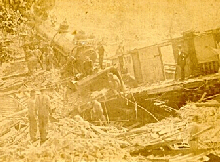LIVES LOST IN A WRECK. Washout Near Atlanta, Ga., Causes Horrible Railway Disaster
LIVES LOST IN A WRECK.Washout Near Atlanta, Ga., Causes Horrible Railway Disaster.VICTIMS CAUGHT IN A TRAP.Local Train Goes Down in a Gulch Near McDonough – Sleeping Car on the End Pins Down the Wreckage – Flames Add to the Disaster – Only Those in the Sleeper Escaped Death.Atlanta, Ga. (Special). -- A passenger train on the Macon branch of the Southern Railway ran into a washout one and a half north of McDonough, Ga., and was completely wrecked. The wreck caught fire and the entire train, with the exception of the sleeper, was destroyed. Every person in the train, except the occupants of the Pullman car, perished. Not a member of the train crew escaped. Thirty-five persons in all were killed.
The list of killed is as follows:
WILLIAM A. BARCLAY, conductor,
Atlanta; J. E. WOOD, conductor, Atlanta;
J. H. HUNNICUT, conductor;
J. T. SULLIVAN, engineer, Atlanta;
W. W. BENNETT, baggage-master, Atlanta;
T. F. MADDOX, cotton buyer, Atlanta;
W. J. PATE and twelve year old son, Atlanta;
H. R. CRESSINAN, Pullman conductor;
GEORGE W. FLOURNAY, Atlanta;
C. C. HIGHTOWER, Stockbridge, Ga.;
W. W. PARK, Macon, Ga.;
ELDER HENSON, traveling man, supposed to have been from Florida;
J. F. FLORIDA, Nashville, Tenn.;
W. O. ELLIS, bridgeman, Stockbridge, Ga.;
D. Y. GRIFFITH, Superior;
J. H. RHOADES, flagman;
JOHN BRANTLEY WHITE, fireman;
WILL GREEN, extra fireman;
W. L. MORRISETT, pump replacer;
W. R. LAWRENCE, foreman extra gang;
ED. BYRD, colored, fireman, Atlanta;
ROBERT SPENCER, train porter;
four unidentified bodies and eight negro section hands.
The wrecked train was a local known at No. 9. It left Macon at 7:10 p. m., and was due in Atlanta at 9:55 p. m. The train reached McDonough on time, 8:50 p. m. A train from Columbus, due to connect with the train from Macon at McDonough, was late and the wreck train did not wait for it.
The train ran only a mile and a half from McDonough, when without warning it plunged into a washout sixty feet deep and 125 feet wide. Camp's Creek had swollen because of the recent heavy rains and cut out the railroad embankment until the culvert through which it flowed was transformed into a gorge, through which a raging torrent surged. The train, consisting of a baggage car, second class coach, first class coach and a Pullman sleeper, was knocked into splinters by the fall. The wreck caught fire in a few minutes after the fall and all the coaches were burned except the Pullman car.
Every person on the train except the occupants of the Pullman car was killed in the accident. Not a member of the train crew escaped. A blinding rainstorm was on. The windows of the coaches were closed and when the passengers went down they were either drowned in the torrent or burned with the wrecked coaches. As the wreck began to go to pieces under the destructive work of the flames and flood bodies floated out and were carried down stream by the current. The storm did not abate in fury. Flashes of lightning added to the steady glow of the burning train. All through the night the rain continued.
The dawn revealed the most disastrous railroad wreck the South has known in many years. An hour after the trains' plunge into the gorge several of those who escaped from the wreck walked into McDonough with the news. Parties were organized at once. Nearly the entire male population of the town went to the scene to render assistance to those imprisoned in the wreckage. Little could be done by the rescuers, however, as the fire kept them at a distance.
At daylight the bodies that had floated from the gorge were gathered up. Some of the bodies were terribly burned, while others were crushed beyond recognition. The only means of identification in the majority of the cases were letters and papers in the pockets of the victims in the catastrophe.
Only three ladies were on the train: two escaped. The bodies of the dead were brought to Atlanta. No blame attaches to the railroad, as other trains had passed the spot in safety only a few hours before the collapse.
The Cranbury Press New Jersey 1900-06-29
The list of killed is as follows:
WILLIAM A. BARCLAY, conductor,
Atlanta; J. E. WOOD, conductor, Atlanta;
J. H. HUNNICUT, conductor;
J. T. SULLIVAN, engineer, Atlanta;
W. W. BENNETT, baggage-master, Atlanta;
T. F. MADDOX, cotton buyer, Atlanta;
W. J. PATE and twelve year old son, Atlanta;
H. R. CRESSINAN, Pullman conductor;
GEORGE W. FLOURNAY, Atlanta;
C. C. HIGHTOWER, Stockbridge, Ga.;
W. W. PARK, Macon, Ga.;
ELDER HENSON, traveling man, supposed to have been from Florida;
J. F. FLORIDA, Nashville, Tenn.;
W. O. ELLIS, bridgeman, Stockbridge, Ga.;
D. Y. GRIFFITH, Superior;
J. H. RHOADES, flagman;
JOHN BRANTLEY WHITE, fireman;
WILL GREEN, extra fireman;
W. L. MORRISETT, pump replacer;
W. R. LAWRENCE, foreman extra gang;
ED. BYRD, colored, fireman, Atlanta;
ROBERT SPENCER, train porter;
four unidentified bodies and eight negro section hands.
The wrecked train was a local known at No. 9. It left Macon at 7:10 p. m., and was due in Atlanta at 9:55 p. m. The train reached McDonough on time, 8:50 p. m. A train from Columbus, due to connect with the train from Macon at McDonough, was late and the wreck train did not wait for it.
The train ran only a mile and a half from McDonough, when without warning it plunged into a washout sixty feet deep and 125 feet wide. Camp's Creek had swollen because of the recent heavy rains and cut out the railroad embankment until the culvert through which it flowed was transformed into a gorge, through which a raging torrent surged. The train, consisting of a baggage car, second class coach, first class coach and a Pullman sleeper, was knocked into splinters by the fall. The wreck caught fire in a few minutes after the fall and all the coaches were burned except the Pullman car.
Every person on the train except the occupants of the Pullman car was killed in the accident. Not a member of the train crew escaped. A blinding rainstorm was on. The windows of the coaches were closed and when the passengers went down they were either drowned in the torrent or burned with the wrecked coaches. As the wreck began to go to pieces under the destructive work of the flames and flood bodies floated out and were carried down stream by the current. The storm did not abate in fury. Flashes of lightning added to the steady glow of the burning train. All through the night the rain continued.
The dawn revealed the most disastrous railroad wreck the South has known in many years. An hour after the trains' plunge into the gorge several of those who escaped from the wreck walked into McDonough with the news. Parties were organized at once. Nearly the entire male population of the town went to the scene to render assistance to those imprisoned in the wreckage. Little could be done by the rescuers, however, as the fire kept them at a distance.
At daylight the bodies that had floated from the gorge were gathered up. Some of the bodies were terribly burned, while others were crushed beyond recognition. The only means of identification in the majority of the cases were letters and papers in the pockets of the victims in the catastrophe.
Only three ladies were on the train: two escaped. The bodies of the dead were brought to Atlanta. No blame attaches to the railroad, as other trains had passed the spot in safety only a few hours before the collapse.
The Cranbury Press New Jersey 1900-06-29





